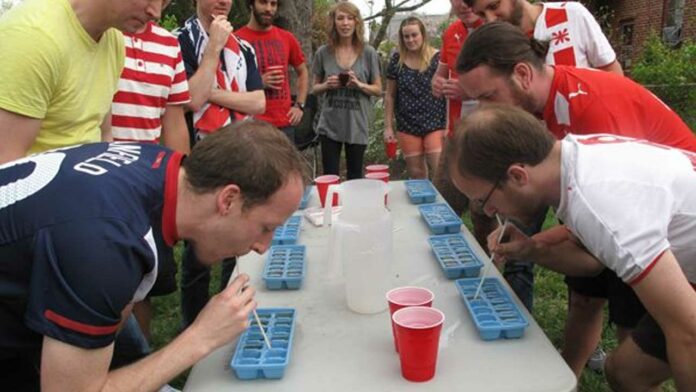Introduction to Beer Olympics
The Beer Olympics is a fun event that mixes sports, friendship, and drinking beer. It’s a get-together where people play different drinking games, often based on real Olympic sports, all while enjoying their favorite beers.
History of Beer Olympics
Early Origins
The Beer Olympics started simply as casual get-togethers among friends, where they played drinking games for fun. Over time, these events grew more organized and popular, especially on college campuses and within various social groups.
Modern Adaptations
In recent times, the Beer Olympics has become much more organized. You can now find structured competitions held at bars, pubs, and even private places. This idea has spread across the world, with different areas adding their own special twists to the games.
Rules and Regulations
Eligibility
Everyone taking part must be old enough to legally drink alcohol and follow all local rules about drinking. Teams usually have four to six people, but this can change depending on what the event organizers decide.
Event Categories
The Beer Olympics includes many different games, such as beer pong, flip cup, boat races, and the well-known “beer mile.” Each game has its own set of rules and a way to score points, all of which add up to a team’s total score.
Scoring System
Teams get points for how well they do in each game, and the winners of those games get more points. The team that has the most points when all the games are finished is named the overall champion.
Popular Events
Beer Pong
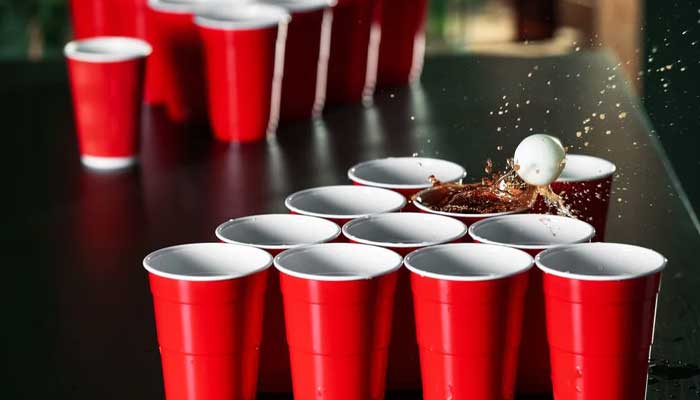
The Beer Olympics has several famous games, and one of the most well-known is beer pong. In this game, players throw ping pong balls into cups that are filled with beer. To be good at beer pong, you need to be accurate, think strategically, and have a steady hand. One of the most famous games in the Beer Olympics is beer pong. To play, you throw ping pong balls into cups that are filled with beer. This game needs a mix of good aim, smart moves, and a steady hand.
Flip Cup
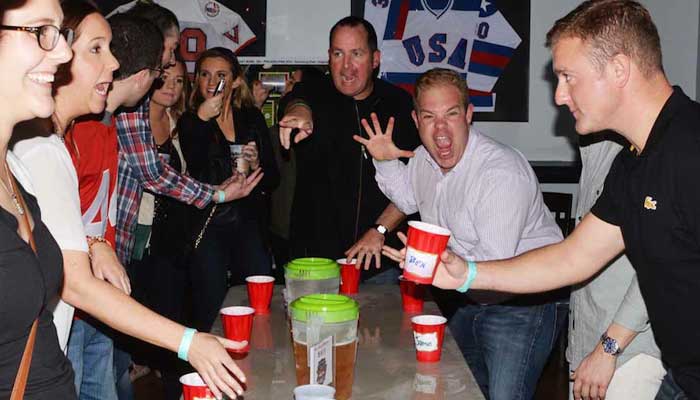
In flip cup, teams try to flip plastic cups upside down by quickly flicking the edge with their fingers. It’s a very fast game that requires good teamwork and quick reactions.
Boat Races
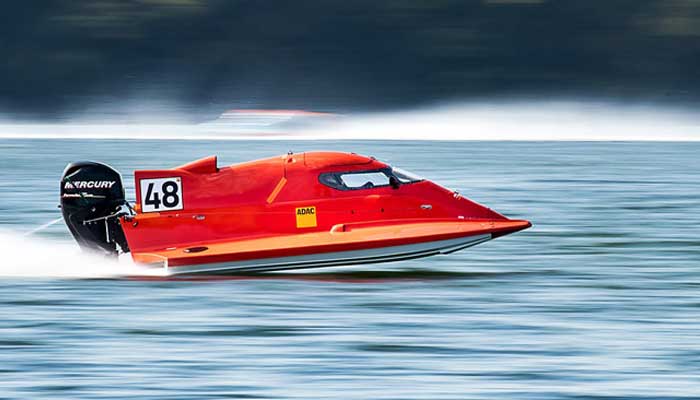
In boat races, teams drink beers one after another in a relay style. Once a person finishes their drink, they pass it (the “baton”) to the next team member. Being fast and efficient is very important to win this game.
Beer Mile
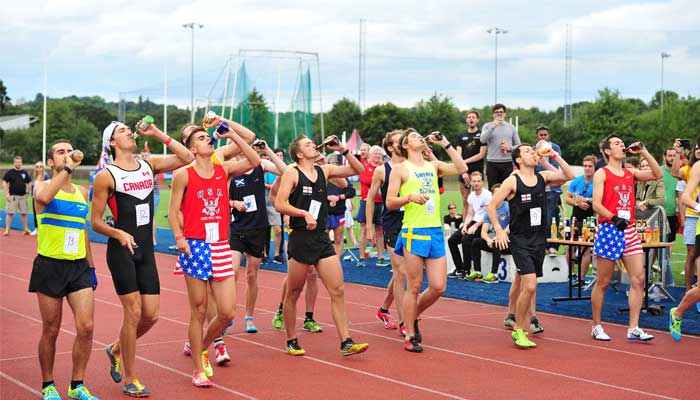
The beer mile is a unique challenge that combines running with drinking beer. Participants have to drink one beer at the beginning of each quarter-mile lap. It’s a true test of both how much you can physically endure and your ability to handle alcohol.
Preparation and Equipment
Venue Setup
Organizers need to make sure the place where the Beer Olympics is held is a good fit. This means having plenty of room for the games and places for people to sit and watch. They also need to provide tables, chairs, and all the things needed for the games.
Supplies Needed
You’ll definitely need cups, balls, and beer. Also, make sure you have any other special gear for the games you’ve picked. It’s really important to have plenty of drinks for everyone who’s playing.
Team Formation and Strategy
Team Dynamics
Strong teams build close connections and talk to each other well. This helps them plan their game strategies and support one another during the competitions. Team members should have different strengths and weaknesses that balance each other out.
Strategic Planning
Teams might come up with plans for each game, aiming to get the most points and make the fewest mistakes. Being able to change these plans is very important, because adapting to new situations can really affect who wins.
Safety and Responsibility
Drinking Responsibly
While the Beer Olympics is all about the fun of drinking, it’s really important to encourage everyone to drink responsibly and respect their own limits. For those who need them, there should be designated drivers or other ways to get home safely.
Monitoring Alcohol Consumption
Organizers need to keep an eye on how much alcohol people are drinking and step in if anyone looks like they’ve had too much. Encouraging everyone to drink water and offering non-alcoholic drinks can help keep the event safe for everyone.
Benefits and Drawbacks
Social Bonding
The Beer Olympics helps build friendships and teamwork among everyone playing. It makes friendships stronger and creates memories that last. It’s a chance for people to relax and have fun together in a casual atmosphere.
Potential Risks
Drinking too much alcohol can cause health and safety problems, such as alcohol poisoning and accidents. People taking part should be aware of how much they can drink and always put their health first during the event.
Global Popularity
Spread of Beer Olympics Worldwide
What began as something only known in one area has now become a worldwide event, with Beer Olympics competitions happening in many different countries and cultures. It breaks through language differences, uniting people through fun shared experiences and a love for beer.
Famous Beer Olympics Events
Oktoberfest
Oktoberfest, which happens every year in Munich, Germany, is one of the biggest and most famous beer festivals anywhere. It offers traditional music and food from Bavaria, and, of course, a lot of beer.
International Beer Games
The International Beer Games bring together teams from all over the world to compete in different challenges involving beer. This shows how popular and culturally important the Beer Olympics idea has become globally.
Impact on the Brewing Industry
Promotion of Beer Culture
The Beer Olympics encourages people to appreciate different kinds of beer and how they are made. It gets participants to try new flavors and brands. It’s also a way for breweries to show off their products and connect with customers in a fun and interactive way.
Marketing Opportunities
Beer companies often support Beer Olympics events. This is a way for them to connect with the people they want to sell to and make more people aware of their brand. There are many chances for them to work together and promote each other, from selling branded items to offering special deals.
Community Involvement
Charity Events
Some Beer Olympics events also include a charity aspect, where they collect money for local good causes or non-profit groups. This adds a meaningful side to the fun, encouraging those taking part to help out their communities.
Local Participation
The Beer Olympics isn’t only for big cities; smaller towns and communities also put on their own events. This helps create a feeling of connection and pride among the people who live there. It’s also an opportunity for local businesses to support community-led activities and build personal relationships with their customers.
Future Trends
Evolution of Beer Olympics
As Beer Olympics continues to evolve, we can expect to see new games, formats, and themes emerge. Organizers may incorporate technology and social media to enhance the participant experience and reach a broader audience.
Sustainability Efforts
As people become more aware of environmental problems, Beer Olympics organizers might start focusing on being more eco-friendly. This could mean using materials that are good for the environment and encouraging smart ways to deal with trash.
Conclusion
The Beer Olympics is much more than just a drinking game. It’s a joyful celebration of friendship, friendly competition, and a shared worldwide love for beer. Whether you’re a very experienced player or just someone looking to have fun, there’s something for everyone to enjoy in this global event.
FAQs
1. What is the origin of Beer olympics?
The Beer Olympics started from simple, informal get-togethers among friends. These casual gatherings later grew into more organized events that featured drinking games, taking inspiration from traditional Olympic sports.
2. Are there age restrictions for participating in Beer olympics?
Yes, there are age restrictions. Everyone who wants to play in the Beer Olympics must be old enough to legally drink alcohol and must follow all local laws about drinking.
3. How are Beer Olympics events scored?
Teams get points based on how well they play in each game, and the teams that win those individual games receive more points. The team that has the highest total score after all the games are finished is declared the overall champion.
4. Is Beer Olympics only about drinking beer?
No, the Beer Olympics is not just about drinking beer. Even though beer is a main part of the event, it also strongly focuses on friendship, teamwork, and friendly competition.
5. Are there any safety measures in place during beer olympic events?
Yes, organizers do put safety measures in place during Beer Olympics events. These include keeping an eye on how much alcohol people are drinking, offering water and other non-alcoholic drinks, and helping to arrange rides for participants who might need them to get home safely.

